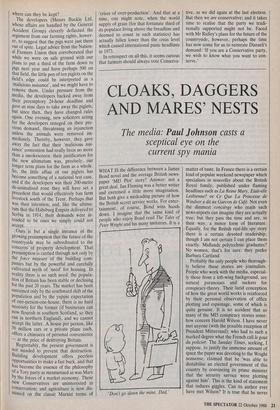CLOAKS, DAGGERS AND MARES' NESTS
sceptical eye on the current spy mania
WHAT IS the difference between a James Bond novel and the average British news- paper 'MI5 Plot' story? Answer: not a great deal. Ian Fleming was a better writer and exercised a little more imagination. But both give a misleading picture of how the British secret service works. For enter- tainment, of course, Bond wins hands down. I imagine that the same kind of people who enjoy Bond read The Tales of Peter Wright and his many imitators. It is a
`Don't go down the mine, Dad.'
matter of taste. In France there is a certain kind of popular weekend newspaper which specialises in nouvelles about the British Royal family, published under flaming headlines such as La Reine Mary, Etait-elle Lesbienne? or Ce Que La Princesse de Windsor a dit au Garcon de Cafe. Not even the dimmest concierge who reads such news-reports can imagine they are actually true; but they pass the time and are, in their way, a minor form of literature. Equally, for the British real-life spy story there is a certain devoted readership, though I am not certain I can place them exactly. Midlands polytechnic graduates? No women, that's for sure: they prefer Barbara Cartland.
Probably the only people who thorough- ly believe these stories are journalists. People who work with the media, especial- ly those from a left-wing background, are natural paranoiacs and suckers for conspiracy-theory. Their lurid conception of how the great world works is reinforced by their personal observation of office plotting and espionage, some of which is quite genuine. It is no accident that so many of the MI5 conspiracy stories some- how concern Harold Wilson. I have never met anyone (with the possible exception of President Mitterrand); who had to such a marked degree what the French call le gout du policier. The Sunday Times, seeking, I suppose, to justify the immense amount of space the paper was devoting to the Wright nonsense, claimed that he 'was able to destabilise an elected government of this country by convincing its prime minister that the security service were plotting against him'. This is the kind of statement that induces giggles. Can its author ever have met Wilson? It is true that he never
went so far as Mitterrand, who took part in his own fake assassination attempt, which involved leaping over a hedge in the Luxembourg gardens in pitch darkness. But Wilson, who was brought up on Bulldog Drummond, surrounded himself throughout his political life with conspir- acies, most of them largely and in some cases entirely imaginary. The first time I met him, in the mid-1950s, he drew me aside to tell me of a scheme to do him down involving two of his fellow- Bevanites. In his last months as prime minister he regaled me with a remarkably similar tale, though the names had changed. Afterwards his patient wife Mary, who had been watching us, asked me, 'Were you getting the Plot?' Yes."Oh dear.' In between these two episodes he had woven, over the years, an interlocking saga of plot and counter-plot which would have done credit to a Sheherezade. The idea that he needed a Peter Wright to convince him that the secret service were planning to do him an injury is preposter- ous. So is the notion of his 1974 govern- ment being 'destabilised'. It was tottering from the word go.
There was indeed a sort of plot against Wilson in the late Sixties, which Cecil King ineffectively tried to organise, and which ended in King being sacked by his own colleagues. But this has been exhaustively (if conflictingly) described by Hugh Cud- lipp, Solly Zuckerman and others. There were one or two cabinet plots too, directed in his usual noisy manner by George Brown; but there were far more when Atlee was prime minister. What is also true is that certain Labour worthies were, and no doubt still are, watched by the security services. So I should hope. The late Tom Driberg, for many years a leading member of the party's National Executive, and in his turn its Chairman, had two passions in life: the English language, which meant that the NEC produced far more literate documents then than it does now, and `cottaging', giving him a knowledge of London public lavatories favoured by homosexuals which will probably never be equalled. He seems to have performed minor duties for both MI6 and the KGB in return for protection. Obviously Driberg was kept under surveillance, though one trusts not all the time: his life was a miserably repetitive epic of lies, betrayals and squalour.
It is said that the Wright business illus- trates how badly our secret service is run and what second-rate people it employs. Certainly Wright seems to know little about our political system. I threw away his wretched book after reading a bit in which he had Ted Heath, then Leader of the Opposition, attending a cabinet meeting and haranguing its members. But it has always been hard to get people who were simultaneously expert, good agents and morally dependable. The service was cre-
ated by Walsingham in Elizabethan times and the scandals go right back to the beginning. One of his best agents, who ran a network in France, was Francis Bacon's brother Anthony. He turned out to be a sodomite and the French authorities caught him at it. The Queen had to appeal personally to Henri of Navarre (later Henri IV) to save him from being burned alive.
Two points strike me about the present outpourings, which I hope will soon be over so we can get back to serious news. First, what made one of the law lords in last week's judgment assume that the editors of national newspapers were 'responsible' people? This may have been true 20 years ago but it is wishful thinking now, as their obsession with this ridiculous business proves. Indeed I can think of only three or four of the present bunch who can fairly be called responsible. The judge should bring his ideas up to date. Second, I am intrigued by some of the moral values the case throws up. If someone were to show that members of the left-wing media were close to certain gents from behind the Iron Curtain,'he would promptly be accused of `McCarthyism'. But when the Plot Corres- pondent of the Observer accuses members of the press of helping the British secret service — a legitimate and indeed praise- worthy activity in my view — that is `investigative journalism'. The distinction tells us a lot about what is wrong with the media today.



































































 Previous page
Previous page